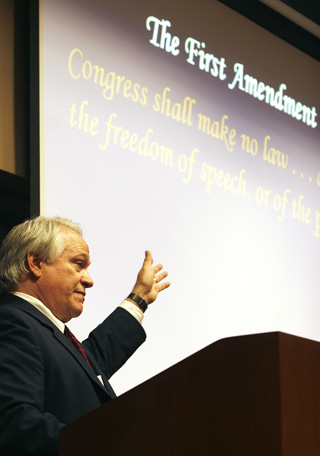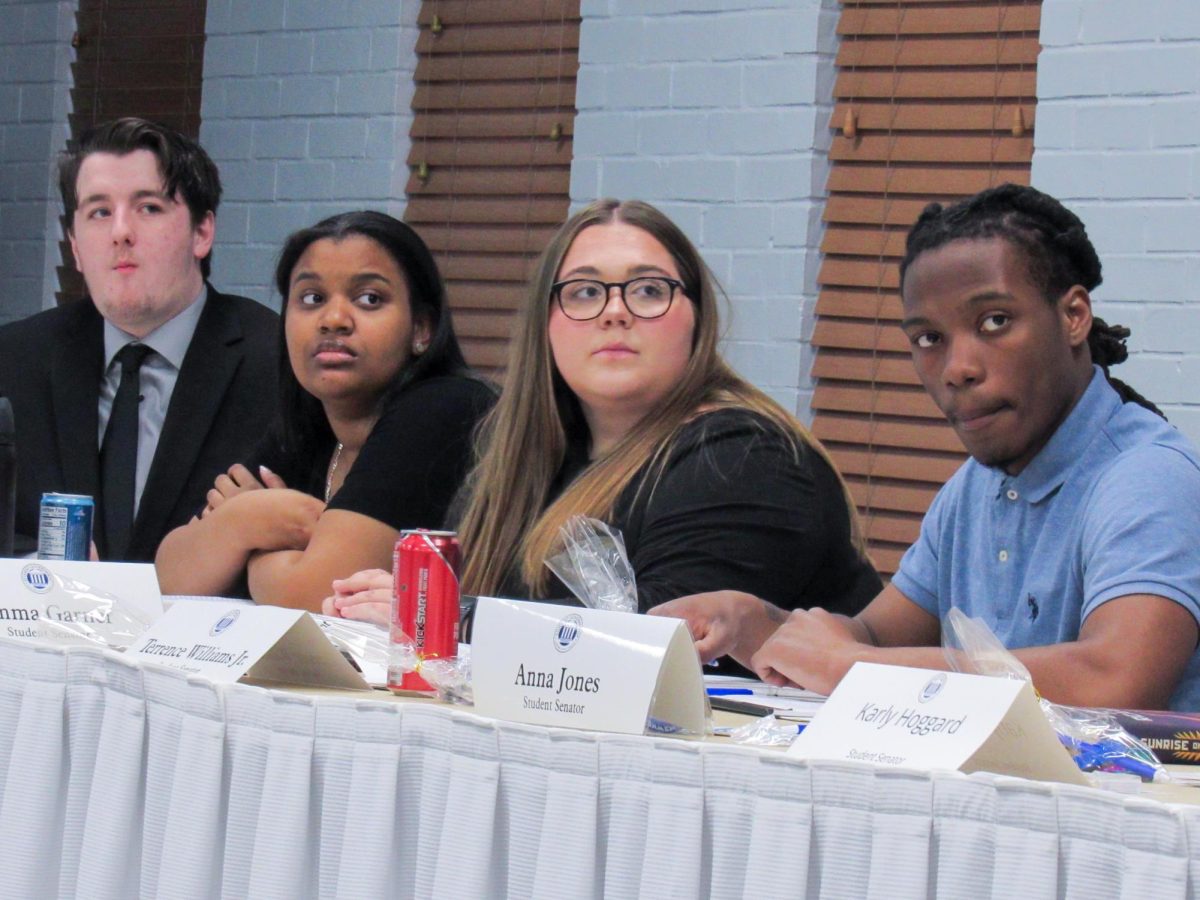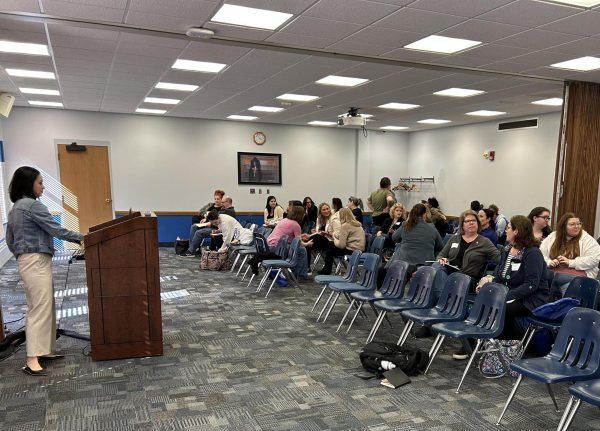New technology bends FCC rules
Millions watched the halftime show of the 2004 Super Bowl, which quickly became one of the most remembered of our time. Janet Jackson and Justin Timberlake performed for the show, broadcasted on CBS, in which a revealing “wardrobe malfunction” stirred up controversy.
First Amendment attorney Robert Corn-Revere found himself in the forefront of the legal battle between CBS and the Federal Communications Commission over whether the breast-baring reveal was indecent. Corn-Revere won the case for CBS, and the $550,000 indecency fine was dropped.
About 60 gathered to hear Corn-Revere speak Tuesday night. The topic of the lecture was “The First Amendment, the FCC and Broadcast Industry.” Corn-Revere focused his attention on major cases in which First Amendment rights were being questioned.
“Bringing up broadcast indecency, that was of course just to get you in here,” Corn-Revere joked.
The idea of indecency, however, was a frequent topic throughout the lecture.
In1957, the Supreme Court in the case Roth v. United States ruled, “obscene speech is not protected by the First Amendment.”
“It wasn’t until 1973 that the government developed a more workable approach to censoring speech,” Corn-Revere said.
In 1973, the Supreme Court in the case Miller v. California developed a systematic way of checking speech and determining whether it was indecent or not.
The justices in the case defined indecent as, “language that in context depicts or describes sexual or excretory activities or organs in terms patently offensive as measured by contemporary community standards for the broadcast medium.”
With new and developing forms of technology such as cable television and the Internet, the rules are beginning to bend, Corn-Revere said.
He said different media each have specific restrictions when it comes to speech.
“I often was curious as to why different forms of technology are protected differently under the First Amendment,” Corn-Revere said.
Radio, television and film each have their own set of regulations, which have been developed by the government. Corn-Revere listed the four main categories of unprotected speech, which include defamation, incitement, fighting words or threats and obscenity.
Ian Revere, son of Corn-Revere, said he believes in strong First Amendment rights.
“We need to protect our rights and uphold the Constitution,” Revere said. “Journalists need to base their profession on protecting those rights.”
As a theater major at Bard College at Simon’s Rock in Great Barrington, Mass., Ian Revere finds that First Amendment rights have a strong influence on his profession.
“Theater was censored especially during the (Joseph) McCarthy era,” Revere said. “There was this worry of being singled out.”
Journalism department chair James Tidwell said he wanted the lecture to be a resource for students that they would not otherwise have.
Tidwell added an important part of college is to take advantage of the opportunities provided.
“This is just an opportunity to hear an expert who has actually been involved in the legal trenches and has helped make important law,” Tidwell said. “You get a real in-the-trenches-look at how a legal case proceeds and how it works.”
Kristin Menas can be reached at 581-7942 or at kmmenas@eiu.edu.
New technology bends FCC rules

Eastern alumni and First Amendment attorney Robert Corn-Revere speaks about how the Federal Communications Commission deals with the First Amendment, indecency, obscenity and other media issues on Tuesday night. (Erin Matheny / The Daily Eastern News)












![[Thumbnail Edition] Junior right-handed Pitcher Lukas Touma catches at the game against Bradley University Tuesday](https://www.dailyeasternnews.com/wp-content/uploads/2025/03/MBSN_14_O-e1743293284377-1200x670.jpg)

![[Thumbnail Edition] Eastern Illinois University baseball senior utility player Tyler Castro fields a ground ball during the team's first intrasquad scrimmage of the season on Jan. 31.](https://www.dailyeasternnews.com/wp-content/uploads/2025/03/BB_01_O-e1742874760130-1-e1742907504722-1200x911.jpg)
![[Thumbnail Edition] Senior Foward Macy McGlone, getsw the ball and gets the point during the first half of the game aginst Western Illinois University,, Eastern Illinois University Lost to Western Illinois University Thursday March 6 20205, 78-75 EIU lost making it the end of their season](https://www.dailyeasternnews.com/wp-content/uploads/2025/03/WBB_OVC_03_O-1-e1743361637111-1200x614.jpg)





































![The Weeklings lead guitarist John Merjave [Left] and guitarist Bob Burger [Right] perform "I Am the Walrus" at The Weeklings Beatles Bash concert in the Dvorak Concert Hall on Saturday.](https://www.dailyeasternnews.com/wp-content/uploads/2025/03/WL_01_O-1200x900.jpg)
![The team listens as its captain Patience Cox [Number 25] lectures to them about what's appropriate to talk about through practice during "The Wolves" on Thursday, March 6, in the Black Box Theatre in the Doudna Fine Arts Center in Charleston, Ill.](https://www.dailyeasternnews.com/wp-content/uploads/2025/03/WolvesPre-12-1200x800.jpg)


















